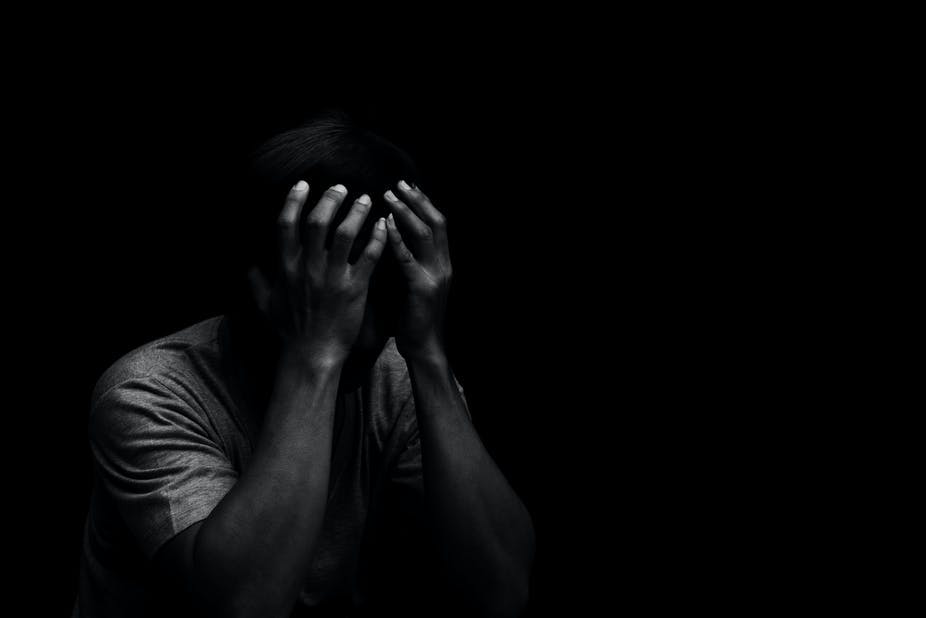 |
| Photo credit: The Conversation |
Author: Nwazue Israel Chihurumnanya
The history of suicide criminalization is as old as time. Well, not as time but as old as the mid-13th century, when the English common law advocated cultural and religious punishments for suicide. As colonialism spread, this legislation was incorporated into the common laws of the English colonies, and by implication, into Nigeria. Though the United Kingdom eventually repealed the punitive measures against suicide in 1961 under the Suicide Act[1], a year shy of Nigeria’s independence, there were no corollary legislative redresses in either the Nigerian criminal or penal codes that already contained said measures. This sad trajectory for mental health in Nigeria was followed by what was a dismal Lunacy Act of 1958 and when the Mental Health Bill was introduced to the House in 2015, there was nothing about correcting the criminal position on suicidal attempts.
Statistical Outlook
Today, Nigeria is one of eight[2] African countries to criminalize suicidal attempts. The nation is according to the WHO[3], home to Africa’s largest number of depressed people, with deaths from suicide[4] averaging 17.3 per 100,000 which by comparison is higher than the global index of 10.5 per 100,000 and the regional African index of 12.0 per 100,000. In 2022 alone no fewer than 79 Nigerians[5] took their own lives.
Sadly, against this backdrop, the argumentation for suicide criminalization has continued to find a ready appeal, especially to the religious bias that saturates the populace. Such retributive penalty has also been argued as the best deterrent from further engagement. Despite the abysmal silence of substantive data to support the latter, the former seems to have hinged the conversation around the pivot of the sanctity of human life as against the autonomy of the individual in such mutual exclusivity that betrays the legitimate concerns of this debate.
It is my aim to demonstrate that the continued criminalization of suicide is defective on legal, logical, philosophical, and ultimately medical grounds. These arguments will show as Fedden rightly notes “that those whom life is altogether bitter should be subjected to further bitterness and degradation seems perverse legislation”
A Legal Critique of Suicide Criminalization
Legally, the snag to the criminalization of suicide manifests in these triadic pertinent oppositions: First is the anachronistic hubris of categorizing as a crime an action whose outcome is not a crime. Since it is legally impossible both due to the absence of any such laws and of the state of the deceased to stand trials for the action of successfully committing suicide, the legal ground to charge the attempt of suicide is outrageously incredulous. It is the legal equivalent of criminalizing attempted murder without charging for murder. This fundamental legal inconsistency was recognized in a defining case[6] 39 years ago by a high court in India, a nation with analogous laws on suicide bequeathed from colonialism. It concluded that the advocacy and practice of suicide litigation operate on an enormous paucity of legal precedence.
Second is an interesting categorical ambiguity of the legal situation of the suicide laws. The 27th and 18th chapters of the criminal and penal codes that contain this law are a subset of crimes that affect ‘the human body of another person’. According to legal and ethical consensus, the act of suicide, being in verity self-inflicted harm cannot and should not on legal or rational grounds be included in the same category. However, only by the broad categorization of suicide attempts under this category, can the statute maintain its force. But the begging question is why a law that fails to be accurately descriptive of the said crime should be allowed to stand.
Then a third objection that continued criminalization faces is the legal discrimination that suicide victims with mental health conditions are maliciously subject to. The defence of insanity, a statute the Northern and Southern criminal and penal codes adopted grants judicial absolution to crimes committed by persons ‘in a state of mental disease’ or in ‘unsoundness of mind’. This legal asylum in the case of suicide cases has been principally slighted, though almost all suicide cases have demonstrably strong connections[7] to bad mental health states, particularly depression. By refusing to acknowledge a constitutionally granted right – that those who attempt suicide are ‘in a state of mental disease’ and therefore exempt from punishment – the enforcers of this law arbitrate these persons to incarceration and other practices that contravene civil conduct and equity — tenets the law is called to protect.
A Logical Critique of Suicide Criminalization
Logically, it can be maintained that the continued stigmatization in criminalization, proven to be statistically incapable of stemming suicide attempts and intrinsically antithetical to remedial measures that address the mental concerns of suicide attempts forfeits any logical grounding for operation.
One forcible assertion the advocates of suicide legislation present is the deterrent fallacy. This fallacy attributes to criminalization some penal potency that will dissuade further suicide attempts. Sadly, there is a deafening statistical silence in its support.
Interestingly, the opposite is true.[8] After examining 20 countries with criminal suicide laws against the global suicide rate and 20 regional anti-suicide law countries, research can categorically say that not much has been achieved numerically in terms of suicide reduction by the former countries. Whereas, countries with anti-suicide laws are doing better; and in cases where decriminalization was followed by an increase in suicide rates, there have been better, earlier reporting of what would otherwise have been reported as anything but suicide to avoid the concomitant legal aggravations.
A Philosophical Critique of Suicide Criminalization
The philosophical groundings for criminalization appear even more piffle. Individuals attempting suicide are probably in a state of mind where life posits with such utter hopelessness that they see no validation for their existence. Suicide is thus attempted in the precarious optimism that whatever is beyond life is preferably better than living.
To suggest forced incarceration as a panacea for such existential pessimism is ideologically ludicrous. Is the assumption that incarceration will stop such persons from attempting suicide? The attempt itself reveals a conviction, a decision with a holistic finality that relegates living and everything else to rigid irrelevance. How then is the threat of more suffering supposed to reduce the suicide rates?
Dismissed for its cowardice, the act of suicide represents an affront on the strongest inclination for self-preservation. By doing or attempting to do the one thing fear mechanisms prevent us from doing – taking one’s life – it is hard to say why another attempt is impossible, especially if pre-suicide conditions resurface. This inordinate fixation that desires to turn a bewildered person into a criminal, risks an underreporting of suicide cases and an irrational detachment of suicide from the realm of a public health issue to a criminal one. Consequentially, the associated stigma, cementing social stereotypes will make it difficult to identify and cater to the mental health needs of these persons.
A Medical Critique to Suicide Criminalization
Medically, the tremendous progress made in health care delivery necessitates an expedient end to any criminal legislation on suicide. A good number of suicide cases are related to mental health disorders that we now have a better understanding of. Already we are witnessing a positive public awareness to the cause and conditions of Alzheimer, Dementia and other age-related cognitive disorders.
These feats anticipate further advancements that will be reflected in a public disposition to seek medical attention in other mental conditions where abandonment has been standard practice. As we appreciate the various medico-social and psychological variables that inundate suicide cases, punitive legislation will prove to be progressively inefficacious. The race to check suicide occurrences will not be won by the gavel and gown, but by the Caducean symbol, as health care workers grapple with the multifactorial issues that surround the intricacies of one life.
Unfortunately, there are already gross medical violations perpetrated under the suicide legislation. Recounting his ordeal to the Cable News Network Ifeanyi Ugokwe sequel to a failed suicide attempt narrated the psychological and physical trauma he was subject to. This among other things included forced medication. Such conditions far from annihilating the thought of suicide in his case reinforced them. Ifeanyi’s experience highlights the disharmonious perspective, Law and Health approach suicide with. The former see it as a crime, the latter, as a medical condition.
The Mental Health Act of 2003, aims to decide this perspective conflict by delineating what should otherwise have been medically demonstrable by now. This definitional struggle hopefully once settled by medicine and in its favour, will leave the legislative efforts no recourse but to recognise suicide objectively for what it has been predominantly demonstrated to be.
Conclusion
In conclusion, as we anticipate a promising future for mental health in Nigeria, the call for decriminalisation of suicide could not be more stentorian. An infamous colonial legislative relic that fails legally to satisfy equity in jurisprudence, logically to measure up to the data, and is bankrupt both of any philosophical depth or medical expediency should still not characterize our national posture on suicide.
The question hopefully is not if criminalization should be annulled but when, and in its replacement, a more holistic productive policy calculated to treat attempts of suicide from the perspective of personhood. For the sake of posterity and those who are caught in the web of uncertainty, many for whom this legislation will prove pivotal, I sincerely hope the days do not tarry when we can chart a different course on suicide criminalization in Nigeria.
References
- BBC News Magazine, 3rd August, 2011, ‘When Suicide was Illegal’
- Premium Times Nigeria, May 26th, 2020, ‘How African Countries Anti-Suicide Laws Support The Opposite’
- The Guardian, April 7th, 2017, ‘Nigerians are the most depressed in Africa, says WHO’
- World Health Organization. Suicide in the World: Global Health Estimates. Geneva: World Health Organization; 2019. pp. 1–33. [Google Scholar]
- The Punch, 31st January, 2023, ’79 Nigerians Commit Suicide in 2022′
- Ranjan, R., Kumar, S., Pattanayak, R. D., Dhawan, A., & Sagar, R. (2014). (De-) Criminalization of attempted suicide in India: A review. Industrial Psychiatry Journal, 23(1), 4–9. https://doi.org/10.4103/0972-6748.144936
- Adewuya, A. O., Ola, B. A., Coker, O. A., Atilola, O., Zachariah, M. P., Olugbile, O., Fasawe, A., & Idris, O. (2016). Prevalence and associated factors for suicidal ideation in the Lagos State Mental Health Survey, Nigeria. BJPsych open, 2(6), 385–389. https://doi.org/10.1192/bjpo.bp.116.004333
- Lew, B., Lester, D., Mustapha, F. I., Yip, P., Chen, Y. Y., Panirselvam, R. R., Hassan, A. S., In, S., Chan, L. F., Ibrahim, N., Chan, C. M. H., & Siau, C. S. (2022). Decriminalizing suicide attempt in the 21st century: an examination of suicide rates in countries that penalize suicide, a critical review. BMC psychiatry, 22(1), 424. https://doi.org/10.1186/s12888-022-04060-5
- CNN, December 30th, 2018, ‘Locked up for trying to take his own life, in a country where it’s a crime to attempt suicide’



